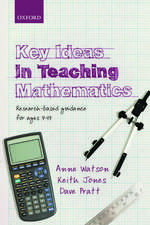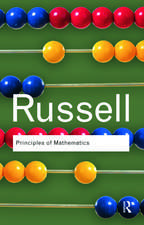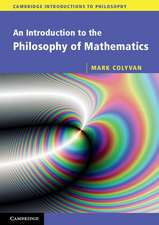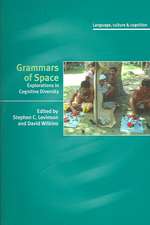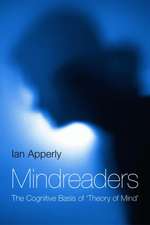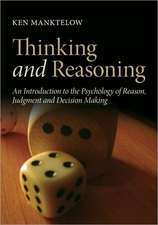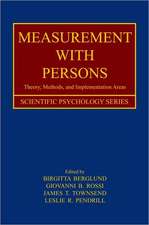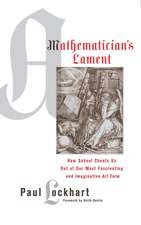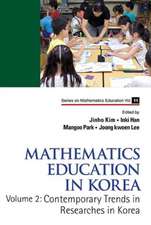Mathematical Reasoning: Patterns, Problems, Conjectures, and Proofs
Autor Raymond Nickersonen Limba Engleză Paperback – 24 noi 2015
This book explores when and why the rudiments of mathematical capability first appeared among human beings, what its fundamental concepts are, and how and why it has grown into the richly branching complex of specialties that it is today. It discusses whether the ‘truths’ of mathematics are discoveries or inventions, and what prompts the emergence of concepts that appear to be descriptive of nothing in human experience. Also covered is the role of esthetics in mathematics: What exactly are mathematicians seeing when they describe a mathematical entity as ‘beautiful’? There is discussion of whether mathematical disability is distinguishable from a general cognitive deficit and whether the potential for mathematical reasoning is best developed through instruction.
This volume is unique in the vast range of psychological questions it covers, as revealed in the work habits and products of numerous mathematicians. It provides fascinating reading for researchers and students with an interest in cognition in general and mathematical cognition in particular. Instructors of mathematics will also find the book’s insights illuminating.
| Toate formatele și edițiile | Preț | Express |
|---|---|---|
| Paperback (1) | 436.14 lei 6-8 săpt. | |
| Taylor & Francis – 24 noi 2015 | 436.14 lei 6-8 săpt. | |
| Hardback (1) | 1016.06 lei 6-8 săpt. | |
| Taylor & Francis – 23 dec 2009 | 1016.06 lei 6-8 săpt. |
Preț: 436.14 lei
Nou
Puncte Express: 654
Preț estimativ în valută:
83.46€ • 87.76$ • 68.96£
83.46€ • 87.76$ • 68.96£
Carte tipărită la comandă
Livrare economică 17 aprilie-01 mai
Preluare comenzi: 021 569.72.76
Specificații
ISBN-13: 9781138980587
ISBN-10: 1138980587
Pagini: 596
Ilustrații: 15 Tables, black and white; 44 Illustrations, black and white
Dimensiuni: 152 x 229 x 31 mm
Greutate: 0.45 kg
Ediția:1
Editura: Taylor & Francis
Colecția Psychology Press
Locul publicării:Oxford, United Kingdom
ISBN-10: 1138980587
Pagini: 596
Ilustrații: 15 Tables, black and white; 44 Illustrations, black and white
Dimensiuni: 152 x 229 x 31 mm
Greutate: 0.45 kg
Ediția:1
Editura: Taylor & Francis
Colecția Psychology Press
Locul publicării:Oxford, United Kingdom
Cuprins
1. What Is Mathematics? 2. Counting. 3. Numbers. 4. Deduction and Abstraction. 5. Proofs. 6. Informal Reasoning. 7. Representations. 8. Infinity. 9. Infinitesimals. 10. Predilections. 11. Esthetics in Mathematics. 12. The Usefulness of Mathematics. 13. Foundations. 14. Preschool Development. 15. Math in Schools. 16. Math Problem Solving. 17. Final Thoughts.
Recenzii
"Few authors who are not mathematicians have the understanding and sympathy for the subject and its practitioners that is shown in this book, whose author is an experimental psychologist and former VP of Bolt Beranek and Newman Inc. He surveys the nature, joys, usefulness, foundations, and teaching of mathematics, in its manifestations of pattern-finding, problem-solving, conjecture-making, and proof-devising. He concludes, "the supreme reason for acquiring some competence in mathematics is the door it opens to an immensely attractive and rewarding workspace—or playground—for the mind." This is a great book for nonmathematicians, one that a mathematician can praise." - Paul Campbell, Beloit College, USA
"Nickerson is a reliable and enthusiastic guide through a many-layered forest of ideas, leading us at each turn to a new appreciation of its topography – the box canyons and precipices and monumental vistas – of this very human adventure. His excellent references mark trailheads for those who would venture farther." - Peter Killeen, Ph.D., Arizona State University, USA
"A wide-ranging and insightful account of the nature of mathematics (its origins, utility, beauty) as well as of cognition and reasoning in general. This book is a welcome antidote to the notion that math is primarily a matter of computation." - John A. Paulos, Ph.D., Temple University, USA
"Nickerson is a reliable and enthusiastic guide through a many-layered forest of ideas, leading us at each turn to a new appreciation of its topography – the box canyons and precipices and monumental vistas – of this very human adventure. His excellent references mark trailheads for those who would venture farther." - Peter Killeen, Ph.D., Arizona State University, USA
"A wide-ranging and insightful account of the nature of mathematics (its origins, utility, beauty) as well as of cognition and reasoning in general. This book is a welcome antidote to the notion that math is primarily a matter of computation." - John A. Paulos, Ph.D., Temple University, USA
Descriere
The development of mathematical competence -- both by humans as a species over millennia and by individuals over their lifetimes -- is a fascinating aspect of human cognition. This book explores a vast range of psychological questions related to mathematical cognition, and provides fascinating insights for researchers and students of cognition and instructors of mathematics.
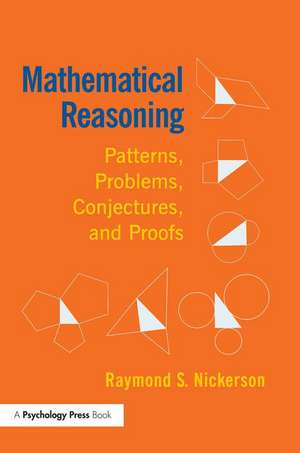
![Maths Frameworking -- Pupil Book 3.1 [Third Edition]](https://i2.books-express.ro/bt/9780007537778/maths-frameworking-pupil-book-3-1-third-edition.jpg)






